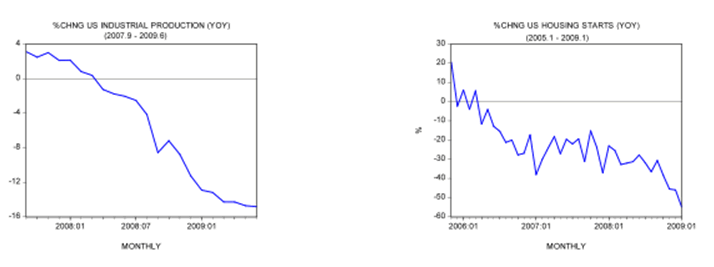
Posted on 04/22/2012 11:06:22 AM PDT by blam
Did Bernanke Prevent Another Great Depression?
Politics / US Economy
April 22, 2012 - 07:02 AM
By: Frank Shostak
In a lecture given at George Washington University on March 27, 2012, the chairman of the Fed said that the US central bank's aggressive response to the 2007–2009 financial crisis and recession helped prevent a worldwide catastrophe. Various economic indicators were showing ominous signs at the time. After closing at 3.1 percent in September 2007, the yearly rate of growth of industrial production fell to minus 14.8 percent by June 2009. The yearly rate of growth of housing starts fell from 20.5 percent in January 2005 to minus 54.8 percent in January 2009.

Also, retail sales came under severe pressure — year on year, the rate of growth fell from 5.2 percent in November 2007 to minus 11.5 percent by August 2008. The unemployment rate jumped from 4.4 percent in March 2007 to 10 percent by October 2009. During this period, the number of unemployed people increased from 13.389 million to 15.421 million — an increase of 2.032 million.
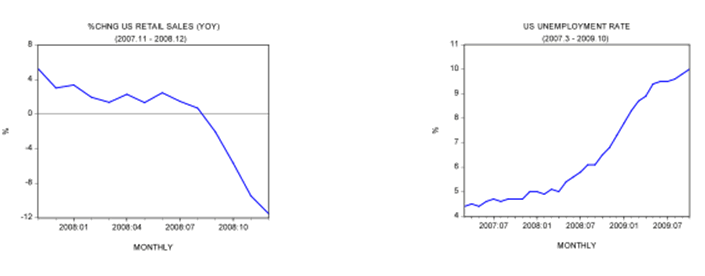
In response to the collapse of the key economic data and a fear of a financial meltdown, the US central bank aggressively pumped money into the banking system. As a result, the Federal Reserve balance sheet jumped from $0.884 trillion in February 2008 to $2.247 trillion in December 2008. The yearly rate of growth of the balance sheet climbed from 1.5 percent in February 2008 to 152.8 percent by December of that year. Additionally the Fed aggressively lowered the federal-funds rate target from 5.25 percent in August 2007 to almost nil by December 2008.
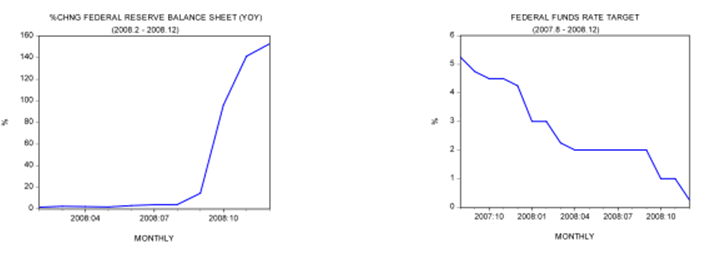
Despite this pumping, the growth momentum of commercial-bank lending had been declining with the yearly rate of growth falling from 11.9 percent in January 2007 to minus 5.3 percent by November 2009. As a result of the fall in the growth momentum of lending, the growth momentum of the money supply would have followed suit if not for the Fed's aggressive pumping to the commercial paper market. This pushed the yearly rate of growth of our measure of US money supply from 1.5 percent in April 2008 to 14.3 percent by August 2009.
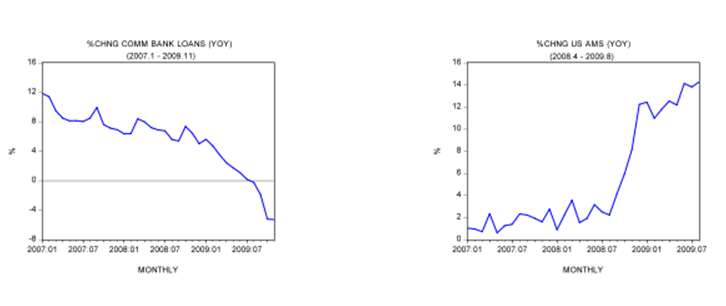
In his speech Bernanke blamed reckless lending in the housing market and financial engineering for the economic crisis. He also acknowledged that the supervision by the Fed was inadequate. According to Bernanke, once the crises emerged the Fed had to act aggressively in order to prevent the crisis from developing into a serious economic disaster. The Fed chairman holds that a highly accommodative monetary policy helps support economic recovery and employment.
We hold that various reckless activities in the housing market couldn't have emerged without the Fed's previous reckless policies. After closing at 6.5 percent in December 2000, the federal-funds rate target was lowered to 1 percent by May 2004. The yearly rate of growth of our monetary measure, AMS, jumped from minus 0.9 percent in December 2000 to 11.5 percent by December 2001. In short, the strong increase in the growth momentum of money supply coupled with an aggressive lowering of interest rates set the platform for various bubble activities, or an economic boom.
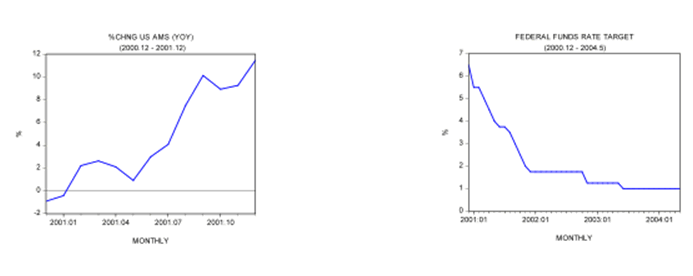
A reversal of the Fed's loose stance put an end to the false boom and put pressure on various bubble activities. The federal-funds-rate target was lifted from 1 percent in May 2004 to 5.25 percent by June 2006. The yearly rate of growth of AMS plunged from 11.5 percent in December 2001 to 0.6 percent in May 2007. As it happened, the effect of this tightening was felt in the housing market first before it spilled over to other bubble sectors. (A tighter monetary stance slowed down the diversion of real savings toward bubble activities from wealth-generating activities.)
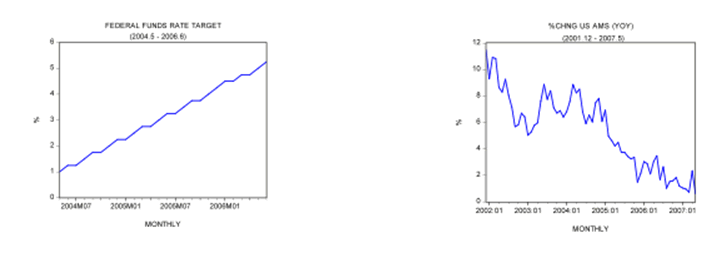
Contrary to Bernanke, we suggest that his loose monetary policy of August 2007 didn't save the US economy but saved various bubble activities that had come under pressure from the previous tighter monetary stance.
Note the loose monetary stance has been aggressively diverting real funding from wealth generators towards bubble activities, thereby weakening the wealth-generation process. The only reason why loose monetary policy supposedly "revived" the economy is because there are still enough wealth generators to support the Fed's reckless policy. Also, note that all the gains from the previous tighter stance have now been wasted to support bubble activities.
As long as the pool of real savings is still growing, Fed policy makers can get away with the illusion that they have saved the US and the world economies. Once the pool of real savings starts stagnating, or worse, declining, the illusory nature of the Fed's policy will be revealed — note that the economy follows the state of the pool of real savings. Any aggressive monetary policy in this case is going to make things much worse.
The actions of Bernanke to revive the economy run contrary to the basic principles of running a company. For instance, in a company of 10 departments, 8 departments are making profits and the other 2 losses. A responsible CEO will shut down or restructure the 2 departments that make losses — failing to do so will divert funding from wealth generators toward loss-making departments, thus weakening the foundation of the entire company. Without the removal or restructuring of the loss-making departments, there is the risk that the entire company could eventually go belly up. So why then should a CEO who decides to support nonprofitable activities be regarded as a failure when Bernanke and his central-bank colleagues are seen as heroes who saved the economy?
Bernanke is of the view that by pumping money he has provided the necessary liquidity to keep the financial system going. We suggest that this is false. What permits the financial sector to push ahead is real savings. The financial sector does not have a life of its own; its only role is to facilitate the real wealth that was generated by the wealth producers. Remember that banks are just intermediaries; they facilitate real savings across the economy by means of money (the medium of exchange).
By flooding the banking system with money, one doesn't create more real savings but, on the contrary, depletes the pool of real funding. Most commentators are of the view that in some cases when there is a threat of serious damage to the financial system the central bank should intervene to prevent the calamity, and this is precisely what Bernanke's Fed did.
We suggest the severe threat here is to various bubble activities that must be removed in order to allow wealth generators to get on with the job of creating wealth. If a lot of bubbles must disappear, so be it. Any policy to support bubbles, be it large banks or other institutions, will only make things much worse. As we have seen, if the pool of real savings is not there, a central-bank policy to prop up bubbles will make things much worse. After all, the Fed cannot generate real wealth.
Bernanke's policy — which amounts to the protection of inefficiency, i.e., bubble activities — runs the risk of generating a prolonged slump with occasional rallies in the data. It could be something similar to the situation in Japan (which Bernanke has in the past criticized).
Summary and Conclusion
We can conclude that, contrary to Bernanke, his loose policies didn't save the US economy from a depression but have instead damaged the process of real wealth generation.
Bernanke's loose policies have provided support to bubble activities, thereby destabilizing the economy. So in this sense his policies have saved the bubbles, thus undermining wealth generators.
We suggest that the more forceful the Fed's response to various economic indicators is, the more damage this does to the pool of real savings. This runs the risk that at some stage the United States could end up having a stagnating or worse, declining, pool of real savings.
If this were to occur, then we could end up of having a severe economic slump. If anyone needs examples in this regard, have a look at countries such as Greece, Spain, and Portugal.
Over a prolonged period of time the policies of these countries (an ever-growing government and central-bank involvement in the economy) have severely damaged the heart of economic growth — the pool of real savings.
Again, if the pool of real savings is to become stagnant, or worse, starts declining, any attempt by the Fed to make things better is going to make things actually much worse by depleting the pool of real savings or funding further. If the pool of real funding is stagnating, then no matter how much pumping the Fed does, banks will not be able to lift lending. Remember: without expanding real funding any expansion in credit could lead to financial disaster.
Hogwash! The $800 BILLION TARP money should have gone to banks which did not gamble with derivatives and operated prudently. Those banks would have kept the credit market operating without a hitch. Those greedy & gambling banks on Wall Street should have been allowed to fail and their business taken over by the good banks.
Yes, at the cost of destroying the US Dollar. The devalued dollar is with us forever, another Depression would have ended, perhaps by now. Perhaps their was no risk, and we destroyed the dollar for no reason, I am in that camp.
Another example of an EXCUSE generated by the government to justify IMPLEMENTING THE CHANGE. The Democrat-fueled FM & FM caused the problem so the government could TAKE CONTROL OF VIRTUALLY ALL HOME LOANS AND OWNERSHIP OF PROPERTY. By the way, Obamacare also gives the government FULL CONTROL of student loans as well.
The socialist 'mission creep' during Obama's reign is STAGGERING. The word 'Democrat' needs to be scrapped! Let's call these insurgents what they are; SOCIALISTS!
No. He prevented a deep recession, but in the process made a Great Depression inevitable...
Everything is going according to the plan.
He probably did, but without a control group it’s impossible to know.
The actions of the Fed before 2007 remind of of those of the second National Bank after the War of 1815. Its reckless policies led to the first great depression. After Nicholas Biddle took over, and improved its management, the country recovered. BUT bankers can harm as well as cure an economy. The more power a ban has, the more harm its can do, and the precariousness of the international situation shows what harm it can do. Only the “Euromess” has prevented the overthrow of the dollar as the international currency. The snowball analogy must be kept in mind: a snowball falling down hill will pick up mass and grow bigger and bigger as it moves downhill. But at some point, its mass reached a size that tears the snowball apart.
Reminds me of: (Could be 16 Taxes)
Tennessee Ernie Ford - 16 Tons
http://www.youtube.com/watch?v=jIfu2A0ezq0
I don’t think so. I think it’s here right now, we have just papered over it. Soup lines replaced with debit cards.
The event that set off the current financial crisis; the first domino that fell, fell in August, 2007 as a result of the consequences of speculation and no doc loans unraveling. Defaults on no doc interest only adjustable rate mortgages that had been securitized and sold across the world as a solid, low risk investment began to default en masse in California. I remember it so well because I was sitting on a beach on Hatteras Island, and remember thinking that I'd better enjoy it, because it might just be the last vacation I'd get for a very long time.
Bernanke was chosen as Greenspan's successor precisely because he'd studied the Great Depression at such length, and had formulated numerous theories as to how to prevent or forestall another. That's how he earned his derogatory nickname, Helicopter Ben.
To make a long story short, this goes back a ways. I'm no fan of Bernanke and haven't been since he made comment about inequitable income distribution in the US, that told me all I needed to know about him. But, he did inherit this mess from Greenspan.
Well let’s see:
1. It is 2012 not 2008. I wonder what Dr. Schwartz thinks now not then.
2. The problems with our economy not unlike the 1930s include:
A. Over regulating business activity and thus reducing it.
B. New social program increasing business uncertainty and thus reducing business activity.
C. Looming tax rate increases.
Monetary policy has no power to change any of them.
3. The deep 1930-33 recession became the great depression due to a follow on recession caused FED action in 1937 THAT WAS IN RESPONSE TO PEOPLE WORRYING ABOUT A HUGE SPIKE IN INFLATION IF NOT HYPER-INFLATION. Does that sound familiar? In terms of the current timeline it would be a FED mistake in 2015 or so. Certainly some people are lobbying for another such mistake because of their concerns with the potential for inflation.
When things such as THIS weren't enough, the BP explosion happened one year later, two days before Earth Day.
No, he probably hastened it.
No one sabotaged the BP rig - get a grip. Until you retreat from that ridiculous position I don’t have anything further to discuss with you.
RIGHT! Glad you caught that. We are all coal miners now - - - - . Well, at least it is not salt, yet.
"I was surprised March 31, 2010 when Obama suddenly announced intentions for expanded offshore East Coast & Gulf drilling.* 21 days later (April 20) and 2 days before Earth Day, 1st accident in 40 yrs!. Then he declares a moratorium, & when struck down in Federal Court, he re-declares a moratorium, in defiance of our Judiciary (3rd, and equal Branch of Govt). Then, retouts his CAP-N-TRADE plan.".
*Remember how surprising this announcement was? 'Out of character' for 0bama, that's for sure.. Almost as if he knew it was an empty promise the moment he said it.
Obama's March 31, 2010 announcement was almost as much of a head scratcher as his statement while in Mexico where he claimed "90% of guns in Mexico come from the United States". Hmmmm.. Perhaps he had something in the works to make that percentage become a reality? Oh, that's right.. 'Fast & Furious'!!!
The verdict is out, I believe that he just kicked the can down the road. Eventually all things must be paid for and when this bill is due it will make the last depression look like a cake walk.
Our Nation's only chance is to get government spending in balance with tax receipts, taxes no more than 18% GDP, start paying down the debit and link our currency to a real commodity. And I don't see anything close to this happening.
Disclaimer: Opinions posted on Free Republic are those of the individual posters and do not necessarily represent the opinion of Free Republic or its management. All materials posted herein are protected by copyright law and the exemption for fair use of copyrighted works.